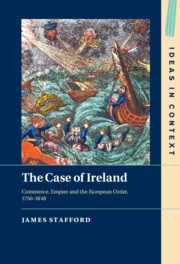Book contents
- The Case of Ireland
- Ideas in Context
- The Case of Ireland
- Copyright page
- Dedication
- Contents
- Acknowledgements
- Introduction
- Chapter 1 The Enlightenment Critique of Empire in Ireland, c. 1750–1776
- Chapter 2 Commerce without Empire?
- Chapter 3 Property, Revolution and Peace, 1789–1803
- Chapter 4 Enlightenment against Revolution
- Chapter 5 The Granary of Great Britain
- Chapter 6 Democracy, Nationality and the Social Question, 1815–1848
- Conclusion
- Bibliography
- Index
Chapter 6 - Democracy, Nationality and the Social Question, 1815–1848
Published online by Cambridge University Press: 27 January 2022
- The Case of Ireland
- Ideas in Context
- The Case of Ireland
- Copyright page
- Dedication
- Contents
- Acknowledgements
- Introduction
- Chapter 1 The Enlightenment Critique of Empire in Ireland, c. 1750–1776
- Chapter 2 Commerce without Empire?
- Chapter 3 Property, Revolution and Peace, 1789–1803
- Chapter 4 Enlightenment against Revolution
- Chapter 5 The Granary of Great Britain
- Chapter 6 Democracy, Nationality and the Social Question, 1815–1848
- Conclusion
- Bibliography
- Index
Summary
Chapter 6 traces the intellectual consequences of the unravelling of Ireland’s grain export boom at the end of the Napoleonic Wars. For British political economists such as Malthus and James Ramsay McCulloch, the path towards Irish recovery could only lie through the assimilation of Ireland to what they took to be an English model of large-scale tenant farming and concentrated land ownership. For European thinkers, however, the parlous condition of the Irish countryside was proof not of Ireland’s divergence from, but its identity with, the monstrous and unsustainable condition of Britain’s ‘aristocratic’ social order. Their critiques were taken up in Britain by a new generation of liberal economists led by John Stuart Mill, and in Ireland by a group of Francophile nationalist intellectuals, Young Ireland. These thinkers re-cast the problem of Irish improvement anew, tying it not to the integration of Ireland into British or imperial markets, but on the creation of a stable class of peasant proprietors to match those that had been created in large parts of continental Europe through French, or French-inspired, land reforms.
Keywords
- Type
- Chapter
- Information
- The Case of IrelandCommerce, Empire and the European Order, 1750–1848, pp. 210 - 252Publisher: Cambridge University PressPrint publication year: 2022

